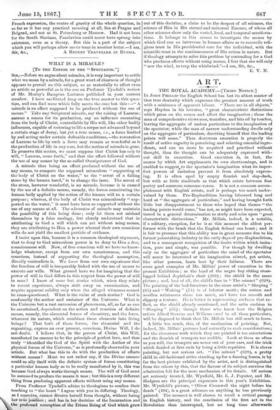WHAT IS A MIRACLE ?
[TO THE EDITOR OF THE 44 SPECTATOR.1
Sin,—Before we argue about miracles, it is very important to settle what we mean by a miracle, for a great want of clearness of thought appears to prevail on this subject, so as materially to affect even an article as powerful as is the one on Professor Tyndall's review of Mr. Mozley's Bampton Lectures published in your current number. 1 have meditated long on the true answer to this ques- tion, and can find none which fully meets the case but this :—" A miracle is an effect supposed to be produced without the use of means." Take any Scriptural miracle, say the raising of Lazarus ; assume a means for its production, say an influence emanating from the body of Christ, controllable by His will, like other bodily influences, capable of restoring to life a corpse not advanced beyond a certain stage of decay, but yet a true means, i.e., a force limited by and acting under certain definable canditions,—the restoration of Lazarus to life by such a force may remain as wonderful as is the production of life in any case, but the notion of miracle is gone. Te preserve this notion, we must suppose that Christ has only to will, " Lazarus, come forth," and that the effect followed without the use of any means by the so-called Omnipotence of God.
A miracle thus being an effect produced without the use of any means, to compare the supposed miraculous " supporting of the body of Christ on the water," to the " arrest of a falling stone by the human hand," is to change the issue. The arrest of the stone, however wonderful, is no miracle, because it is caused by the use of a definite means, namely, the forces constituting the human body applied by the action of the human will to a certain purpose ; whereas, if the body of Christ was miraculously " sup- ported on the water," it must have been so supported without the use of any means at all. The advocates of miracle may maintain the possibility of this being done ; only let them not mislead themselves by a false analogy, but clearly understand that in attributing to God a will which can act without using means, they are attributing to Him a power whereof their own conscious wills do not yield the smallest particle of evidence.
I insist upon this, because it is a common theological argument, that to deny to God miraculous power is to deny to Him a free, consciousness will. Now, of free conscious will we have no know- ledge whatever, except from our own consciousness, and this conscious, instead of supporting the theological assumption, direCtly contradicts it. We know from our own experience that the freedom of will is inseparably linked with the use of means to execute our wills. What ground have we for imagining that the power of will in God differs in this respect from the power of will in man? I know of none but stories which, when they relate to recent experience, always melt away on examination, and acquire apparent solidity only when the alleged witnesses cannot be cross-questioned. What is the value of such stories ? God is confessedly the author and sustainer of the Universe. What is the Universe but a vast succession of phenomena, all, so far as can be ascertained, dependent on the action and reaction of definite means, namely, the elemental forces of chemistry, and the force, whatever its nature, which combines these elements into living beings ? That both of these forces, the elemental and the organizing, express an ever present, conscious, Divine Will, I do not doubt. I believe that, in the person of Christ, this Will, manifested its essence to be the principle of perfect love, and thus truly " identified the God of the Spirit with the Author of the physical forces of the Universe," as is profoundly observed in your article. But what has this to do with the production of effects without means? Must we not rather say, if the Divine essence could so ally itself with the definite system of forces constituting a particular human body as to be really manifested by it, this was because God always works through means. The will of God must be assumed to produce the means it uses ; but this is a very different thing from producing apparent effects without using any means.
From Professor Tyndall's advice to theologians to confine their teaching to " the heart " I agree with you in differing. Theology, as 1 conceive, cannot divorce herself from thought, without losing her true position ; and has in her doctrine of the Incarnation and the profound conception of the Triune Being of God Which grew. out of this doctrine, a claim to be the deepest of all sciences, the science of Him in His eternal and universal Essence, of whom all other sciences show only. the varied, local, and temporal manifesta- tions. It belongs to this cience to investigate the means by which God can so intervene in human affairs as to reconcile reli- gious trust in His providential care for the individual, with the scientific trust in the continuousness of His action in nature. But if theology attempts to solve this problem by contending for a God who produces effects without using means, I fear that she will only " sow the wind, to reap the whirlwind."—I am, Sir, &c., E. V. N.






























 Previous page
Previous page